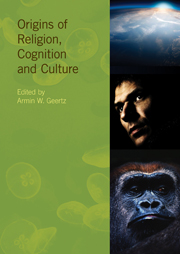Book contents
- Frontmatter
- Contents
- Contributors
- Introduction
- Part I EVOLUTIONARY SCENARIOS
- Part II COGNITIVE THEORIES
- 11 Cognition and meaning
- 12 Wittgenstein and the naturalness of religious belief
- 13 “Peekaboo!” and object permanence: on the play of concealment and appearance in cognition and religion
- 14 Yogācāra Buddhist views on the causal relation between language, cognition and the evolution of worlds
- 15 A resource model of religious cognition: motivation as a primary determinant for the complexity of supernatural agency representations
- 16 The recognition of religion: archaeological diagnosis and implicit theorizing
- 17 Religion and the extra-somatics of conceptual thought
- 18 Tools for thought: the ritual use of ordinary tools
- 19 Care of the soul: empathy in dualistic worldview
- 20 From corpse to concept: a cognitive theory on the ritualized treatment of dead bodies
- 21 Anthropomorphism in god concepts: the role of narrative
- Index
12 - Wittgenstein and the naturalness of religious belief
from Part II - COGNITIVE THEORIES
- Frontmatter
- Contents
- Contributors
- Introduction
- Part I EVOLUTIONARY SCENARIOS
- Part II COGNITIVE THEORIES
- 11 Cognition and meaning
- 12 Wittgenstein and the naturalness of religious belief
- 13 “Peekaboo!” and object permanence: on the play of concealment and appearance in cognition and religion
- 14 Yogācāra Buddhist views on the causal relation between language, cognition and the evolution of worlds
- 15 A resource model of religious cognition: motivation as a primary determinant for the complexity of supernatural agency representations
- 16 The recognition of religion: archaeological diagnosis and implicit theorizing
- 17 Religion and the extra-somatics of conceptual thought
- 18 Tools for thought: the ritual use of ordinary tools
- 19 Care of the soul: empathy in dualistic worldview
- 20 From corpse to concept: a cognitive theory on the ritualized treatment of dead bodies
- 21 Anthropomorphism in god concepts: the role of narrative
- Index
Summary
Wittgenstein and the cognitive science of religion share the broad objective of distinguishing between science and religion but vary in their methodological approaches. These divergences raise the question of the extent to which they are in accord about substantive questions concerning religion. The cognitive science of religion aims to differentiate between science and religion through investigation into their cognitive foundations and cultural expressions using a number of methodological precepts (Boyer 1994). Insight into many features of religious cognition can be gained through the use of the approaches and findings of cognitive science. Concept choice should be guided by explanatory scientific theories. Repeated patterns of individual and communal religious behaviour are to be clearly explicated so that testable theories which elucidate this can be formulated. A widespread conception in religious studies which the cognitive science of religion opposes is that religion requires special methods of study because it and especially religious experiences are deemed to be unique. In this conception, scholars (e.g. Cannon 1996; Paden 1992) argue that the distinctive position of religion puts a restriction in principle upon the capacity of scientific theories to explain it. It is argued that customary explanatory practices in the natural and social sciences will fail to provide appropriate insight into the phenomena of religion and that their effectiveness is limited. An assumption which underpins this perspective is that religion is concerned with the non-natural, but sustained reasoning is infrequently provided for claims of this kind. Indeed some commentators (for instance Lawson & McCauley 1990, 1993) claim that this presupposition indicates that the field of religious studies quite frequently contains concealed assumptions about religion.
- Type
- Chapter
- Information
- Origins of Religion, Cognition and Culture , pp. 258 - 268Publisher: Acumen PublishingPrint publication year: 2013



